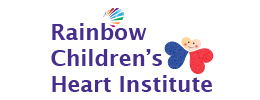Tetralogy of Fallot is a condition when there are four consecutive issues with the heart. It is a very rare ailment that can be caused by both external and internal reasons. The external reasons can be environmental issues and lifestyle changes. The internal factors are genetic defects, organ problems and more. The TOF procedure has a high success rate thanks to the developments in medical science. Kids and adults with this condition have the chance to lead relatively normal lives provided they follow the instructions of the doctor. At Rainbow Children’s Heart Institute, there are different surgical treatment options to help people cope with the TOF surgery with the best possible options. Read on to know more
What is TOF?
The Tetralogy of Fallot or TOF as it is often referred to is a heart condition that is determined and diagnosed in infancy. And if you are lucky, you might even detect the symptoms well in advance during the pregnancy months. The infants born with the condition are usually blue skinned because of the lack of proper blood supply. Either their hearts are too weak to pump blood or their arteries are clogged. There can also be an issue with the flow of blood leading to the bruises and breathing issues. A heart specialist institute in Hyderabad is the right place for you to land up to know more about TOF.
TOF procedure aims at correcting this issue. It is a process by which the doctors identify the damages in the heart and then operate on it. The operation is complicated but has a high success rate. You can lead a relatively normal life as an adult even after the condition.
Pretreatment process
The treatment requires a lot of precautionary measures and preparatory steps though. If your child is suffering from the issue, then the doctor might prescribe some tests to check the body stats. This would include a standard X-ray, MRIs, CTI scans and ultrasound well. The patient might also be required to send out urine and blood samples.
In the case of infants, you also need a blood donor who is compatible with their hearts. Usually the mother or father fits the bill. You should also be consulting the doctor about the injections and anesthesia that is recommended in these cases. Discuss the dosage and risks involved as well so that you are prepared beforehand.
Post-surgery care
Once the surgery is successful your job doesn’t end as after the operation, there comes the post-surgery care. This means that you have to be extra careful about handling the young one. Ensure that your child gets the best treatments from reputed hospitals and experienced doctors. You can also consult multiple experts about the case to reduce the risks of any error. A cardiology specialist in Hyderabad can explain you know more about the post-surgery care that every patient needs to take.
After the operation, you have to monitor the physical exposure, activity and diet of the patient. If it is an infant, then the mother’s diet is also taken into consideration. Track the medicine dosage, ask about the healthcare equipment used and other details before the discharge as well. And take your kid to the doctor immediately if you notice anything abnormal or serious.
FAQs about TOF
Here are some commonly asked questions about the procedure that you should know about;
What is the success rate of TOF?
The success rate of the TOF procedure has improved immensely over the past few years. Doctors and research experts are always on the lookout for new and unique treatments and surgeries. These operations are also a lot less pain free. Plus, the recovery period has also reduced over time. Your child can now be discharged and have a shot at a normal life.
How do you care for the child post TOF?
Post treatment care and precautionary measures are an imperative part of fighting the condition. You have to talk to the doctor about the kind of diet and exercises that the patient has to undergo. If your child is but a few months old, then it is safer to put them in neonatal care until they are stronger. There are oxygen masks, chest pumps and more as well.
What are the common signs of identifying the issue?
Some of the most common symptoms are that the body would turn blue due to lack of blood circulation. Also, if the kid is eerily still, has breathing issues or is crying unnaturally then you know something is wrong. Fainting, malnutrition, irritation, nausea, fever and heart murmur are other tell-tale signs that you can keep an eye out for.
The bottom line
TOS is a complicated procedure. And no parent would want their child to go through the suffering. Motherhood and pregnancy are a wonderful, life changing experience. Seeing your baby all blue and struggling to breathe is an absolute nightmare that no one should experience. Thankfully with the TOF procedure you have a way out of the problem and a chance to give your child a normal life.
